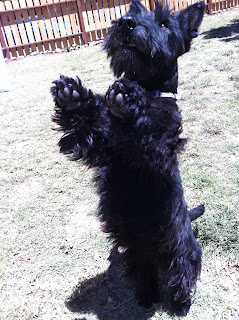 Dogs and humans love attention. Dogs love to be loved, looked at, played with and praised. Some dogs require more attention than others and some have been conditioned and trained to beg for attention. When I was a kid, I had a golden retriever named Sarah who would push her snout under my hand and insist that I pet her. She would stop at nothing to have me touching her, petting her, loving her and adoring her. I would always give in and pet her all the time, so the snout nudging continued and naturally the behavior increased. Oftentimes, a lot of 'bad behavior' is a result of a dog seeking attention. Instead of a casual, cute nudge of the nose, attention-seeking behavior might be displayed in ways that are often incorrectly interpreted as 'dominant' behavior. Pawing, jumping up, mouthing, barking etc., have been coined as being aggressive displays of dogs trying to be 'alpha dogs'. However, this is simply not the case.
Dogs and humans love attention. Dogs love to be loved, looked at, played with and praised. Some dogs require more attention than others and some have been conditioned and trained to beg for attention. When I was a kid, I had a golden retriever named Sarah who would push her snout under my hand and insist that I pet her. She would stop at nothing to have me touching her, petting her, loving her and adoring her. I would always give in and pet her all the time, so the snout nudging continued and naturally the behavior increased. Oftentimes, a lot of 'bad behavior' is a result of a dog seeking attention. Instead of a casual, cute nudge of the nose, attention-seeking behavior might be displayed in ways that are often incorrectly interpreted as 'dominant' behavior. Pawing, jumping up, mouthing, barking etc., have been coined as being aggressive displays of dogs trying to be 'alpha dogs'. However, this is simply not the case.
Dogs are constantly being affected by their environment and also operating on it. The first time that a puppy jumps up onto someone's lap they are usually met with a cute, loving gaze and a happy smile from someone that thinks the behavior is adorable. The puppy learns that jumping up gets him attention and adoration. Something that is good and pleasurable, so the behavior is being rewarded meaning that it will increase. Eventually the puppy grows up into a 70 lb. exuberant 10 month old youngster and the jumping up in someone's lap is considered bad, dominant behavior that should be harshly corrected with a jerk on a leash. The punishment doesn't often work however, because one person may harshly punish the puppy, but then the next person might still think it's cute, so the puppy becomes confused and anxiety may set in. It's the owner's responsibility to realize that the puppy was taught one thing and now there are new expectations. The owner must start training himself to only pet the puppy when he is sitting. Something I like to call Sit-for-Pets. If the puppy jumps it's important to turn your back to your puppy and not look at him until he is calm enough for you to ask him to sit. As soon as he's sitting, then you can turn around and pet him while telling him, "Good sit!". If your dog is capable of bowling over people and scratching their legs up, it's important to manage the first part of the training by stepping on a leash and asking people to not give your giant, lovable, jumping pup any attention until he calms down and sits. As soon as he sits, they can give him all the love and attention in the world. Then the puppy will be rewarded with good positive attention instead of the puppy turning into giant jumping bean who is begging for attention regardless if it's positive or negative attention.
Pawing, mouthing, barking, whining and other behaviors along these lines, are all inventive ways that dogs have used to elicit attention from their owners. People who push their dog away and say their dog's name followed by a no all the time, are all giving in to what their dog wants- attention! Even if it's negative attention they are happy. Just looking at them makes them happy. Just saying their name is attention. As a result, the behavior will continue and sometimes even get worse.

So, how do you extinguish unwanted attention seeking behaviors? Simply by ignoring it altogether. I know, I know this can be very, very difficult. It's no fun to have a giant great dane pawing you with his big ol' paw or a whiny poodle sit there crying at you. But you have to stick to your guns and be consistent. The other very important part of the equation is to identify and understand what your dog needs. Does your dog need to go outside to go potty, is he hungry, is he not well-exercised, is he not feeling well, etc.? Before the attention seeking behaviors start happening, make sure that all of your dog's basic needs have been met. Then it's very important to ask yourself, "How can I show my dog what I want him to do instead?". For example, if your dog chews on anything in sight or jumps in your lap when you're trying to watch TV, make sure that your dog has been well-exercised and mentally stimulated that day, and then teach your dog to go to his spot, 'settle', and reward him with praise, treats or a bully stick for staying on his bed. You can also click and treat your dog anytime that your dog is just laying there. Imagine that! Treating your dog for just relaxing! Too often we forget to reward calm behavior and instead we give too much attention to bad behavior. Humans have a 'bad' habit of having a negative bias, meaning we tend to give too much attention to negative things and we often overlook positive, good or comfortable things.
The other day, I realized that I was being an 'attention-seeking dog'. The waves had been really good all weekend and as a result, I didn't see much of my boyfriend. He was either surfing or working all weekend, so poor little needy me got a little grouchy. I put on a pouty face and decided to not be very pleasant when my boyfriend needed me to do him a favor. He had no idea why I was upset and responded with negative attention, "What's the matter with you?". I realized that I was almost happy because of the negative attention! "No wonder so many couples get into arguments", I thought to myself. It's simply another way of getting attention. Realizing that I was being an attention-seeking dog (aka a bitch), I decided to communicate my frustration and turn it into a positive experience instead. "I'm sorry, I just realized that I've missed you this weekend, and I would love to go on a date with you tonight when you have some time, " I told him. All of a sudden, the whole mood changed and my loving boyfriend said, "Of course!", and we ended up going out that night and had a wonderful conversation over a yummy dinner. I got the positive attention that I was begging for and my boyfriend got a pleasant girlfriend rather than a bitchy one. Problem solved due to positive, effective communication! You can train yourself, your boyfriend and your dog with positive reinforcement training!
Happy training!
 Dogs and humans love attention. Dogs love to be loved, looked at, played with and praised. Some dogs require more attention than others and some have been conditioned and trained to beg for attention. When I was a kid, I had a golden retriever named Sarah who would push her snout under my hand and insist that I pet her. She would stop at nothing to have me touching her, petting her, loving her and adoring her. I would always give in and pet her all the time, so the snout nudging continued and naturally the behavior increased. Oftentimes, a lot of 'bad behavior' is a result of a dog seeking attention. Instead of a casual, cute nudge of the nose, attention-seeking behavior might be displayed in ways that are often incorrectly interpreted as 'dominant' behavior. Pawing, jumping up, mouthing, barking etc., have been coined as being aggressive displays of dogs trying to be 'alpha dogs'. However, this is simply not the case.
Dogs and humans love attention. Dogs love to be loved, looked at, played with and praised. Some dogs require more attention than others and some have been conditioned and trained to beg for attention. When I was a kid, I had a golden retriever named Sarah who would push her snout under my hand and insist that I pet her. She would stop at nothing to have me touching her, petting her, loving her and adoring her. I would always give in and pet her all the time, so the snout nudging continued and naturally the behavior increased. Oftentimes, a lot of 'bad behavior' is a result of a dog seeking attention. Instead of a casual, cute nudge of the nose, attention-seeking behavior might be displayed in ways that are often incorrectly interpreted as 'dominant' behavior. Pawing, jumping up, mouthing, barking etc., have been coined as being aggressive displays of dogs trying to be 'alpha dogs'. However, this is simply not the case.


